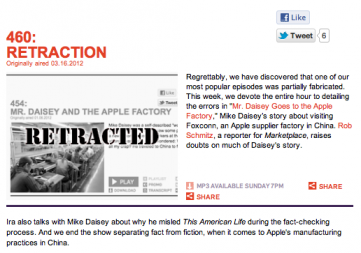2 Bites of the Same Bitter Apple
 Recently the public radio program This American Life had to issue a retraction of a story it ran in January.
Recently the public radio program This American Life had to issue a retraction of a story it ran in January.
The way it did so was instructive.
The story featured writer/actor Mike Daisey, whose one-man show “The Agony and the Ecstasy of Steve Jobs” exposed alleged abuses at the Foxconn plant in China, where Apple products are assembled. The show became the most popular episode on This American Life, with close to a million downloads and streams.
Soon after the segment aired, however, it was revealed that some of Daisey’s more outrageous claims were fabrications.
“We’re horrified to have let something like this onto public radio,” said host Ira Glass in a press release retracting the episode.
But This American Life did not stop there. It devoted an entire second show to dissecting the first one: detailing the inconsistencies, apologizing for the errors, and laying out the true facts.
Ouch. That could not have been fun. Disavowing its own blockbuster program and stripping it bare was like having your home run disqualified and having to run around the bases backwards because you used a corked bat – in front of a million upset fans.
It would have been tempting – and understandable – for This American Life to place all the blame on Daisey and admit only to having been suckered by a brilliant con man.
Instead, it stepped up and assumed full responsibility.
“We never should’ve put this on the air,” said Glass. “In the end this was our mistake.”
Think of what our profession would be like if all lawyers acted this way. If, when we make a mistake, we (a) acknowledge the error with speed and honesty, (b) get to the bottom of the matter, and (c) do whatever it takes to fix the problem.
Too often, though, we would rather point fingers than take ownership. It was somebody else’s fault. The client was a jerk. The case was a loser anyway. We waste time and energy with denials, rationalizations and defensiveness.
Not to mention our ethical obligations. The Rules of Professional Conduct impose upon us a duty of candor. We have a duty to tell the truth to our clients, colleagues and courts. Even if that truth hurts.
It starts with being truthful with ourselves. But unlike This American Life, we don’t have to do it alone. Groups like PALS, FRIENDS and BarCares offer confidential help. Experienced colleagues are always willing to lend an ear or a hand. Lawyers Mutual and the State Bar encourage us to report problems quickly – and might be able to help us fix them.
Everyone makes mistakes. In that respect we are all alike. How we deal with our mistakes makes all the difference.
After all, it’s not called “coming clean” for nothing.



